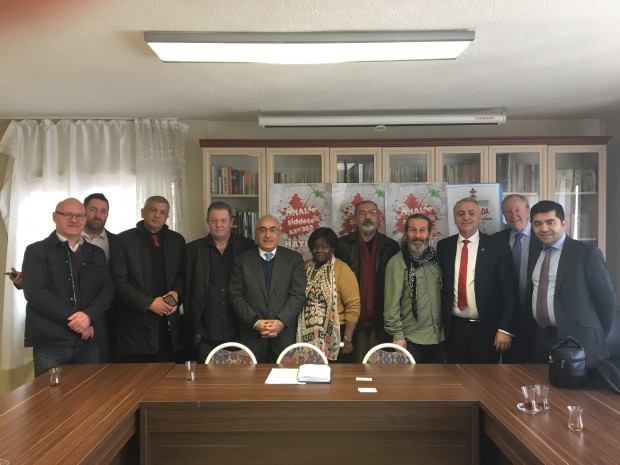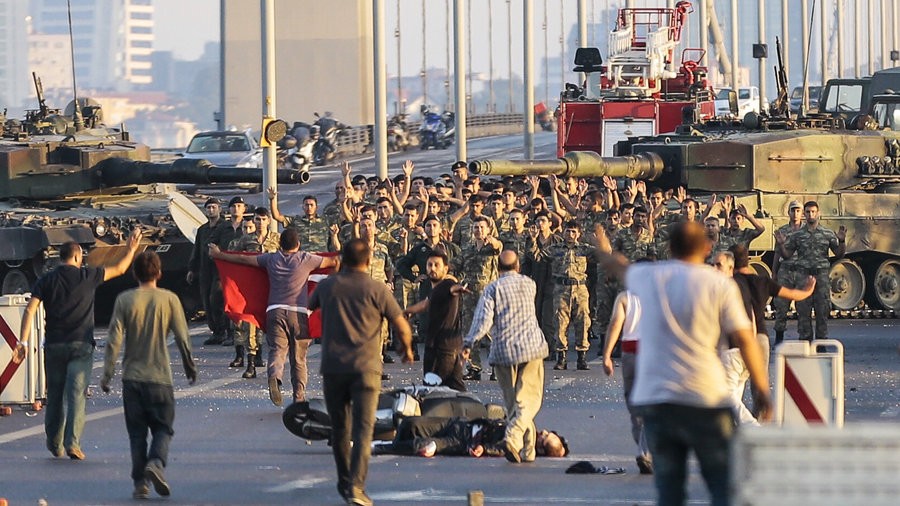26 January 2018
The threat to Turkish democracy - Paul Maskey MP

"It wouldn’t take long before the attitude of the Turkish authorities towards us as observers would be made clear. Through the use of heavy police presence, we were denied access to the court and the hearings of the HDP leaders. The ruling of the judge, to allow us to enter, made little difference to the riot shields and batons of the Turkish police." - Paul Maskey MP
I recently joined an international delegation to observe trials the Turkish government had brought against leaders of the HDP (Peoples Democratic Party). The party’s co-chairs Ms. Figen Yüksekdağ and Mr. Selahattin Demirtaş were tried on 6th and 7th December respectively.
Throughout the delegation, which consisted of representatives from over a dozen countries, we had regular contact with leading HDP members, including Deputy Chair, Hişyar Özsoy MP, who was responsible for the general coordination of the international delegation.
Our role, as is the responsibility of all Sinn Féin MPs acting as international delegates, was to remain impartially observant throughout the trial’s proceedings, and to register any irregularities which may appear. In short, to ensure the integrity of the legal action taken against the leaders of the HDP.
From the beginning, however, it was clear this trial was politically loaded. Much has been written in Western press about the collapse of democratic institutions in Turkey in recent years, and the increasingly autocratic grip Turkish President Erdogan has asserted over the judicial system.
His attacks on freedom of assembly, expression and political activity, and the employment of the military and legal strictures as a means of targeting political opponents, is the context in which these trials were firmly rooted.
Mrs. Yuksekdag and Mr. Demirtas were arrested and detained in prison since November, 2016. The charges brought against them related to alleged 'terrorist' activities. Their litany of ‘crimes’, as defined by the Turkish government, also included speeches in Parliament, speeches at political rallies, party meetings, press statements and general opposition party activities.
The HDP through the leadership of Mr. Demirtas and Mrs. Yuksekdag has seen the party gain considerable support and has increased its vote share, becoming the third largest party in Turkey in 2015. As Erdogan represents a descent into autocracy in the service of his political ambitions, the HDP offer a secular, progressive, democratic and socially liberating vision which has resonated with the electorate.
Following the 2015 election in Turkey, new laws were rushed through Parliament in order to strip elected representatives of their parliamentary immunity, leading to the subsequent arrest and detention of 13 HDP members of parliament, including the two co-chairs.
It wouldn’t take long before the attitude of the Turkish authorities towards us as observers would be made clear. Through the use of heavy police presence, we were denied access to the court and the hearings of the HDP leaders. The ruling of the judge, to allow us to enter, made little difference to the riot shields and batons of the Turkish police.
The legal team for the two co-chairs spoke to the judge who had stated we could enter then changed his decision after the police continued to refuse us entry. We were told that it was a security risk if we entered the court.
In the midst of the alleged threat posed by our pens and paper, the hearings were moved to Sincan High Security Prison Complex, the location of which was remote without any public access. Protected by barbed wire, heavily armed police, and constant surveillance, the trials went ahead.
There was a press conference at HDP headquarters with the international observers so that they could state what they witnessed over the two-day period. The small number of journalists in attendance indicated the intimidation felt by sections of the Turkish press. Hundreds of journalists languish in Turkish prisons for essentially reporting, from a critical perspective, the draconian actions of Erdogan’s regime. In this regard, the absence of the international media was also significant.

Following the failed coup attempt in 2016, Erdogan responded with waves of arbitrary arrests and state sanctions against civic society. Over 20,000 teachers, doctors, lecturers and civil servants were apprehended by Turkish authorities. More still were arrested for protesting against their arbitrary dismissal from employment for their political views.
In a deeply moving episode, we came into contact with two imprisoned public sector workers – they were entering the 275th day of their hunger strike against the Turkish regime. Subsisting on only water and sugar, they were severely undernourished, wishing only for the international community to recognise their plight, and that of thousands of others persecuted by the apparatus of the Turkish state.
The two court cases have been postponed until February 2018, and the HDP have repeated their call for another international delegation. The trials of the HDP leaders are crucial, but for me they represent a flagrant and widespread abuse of human rights and pervasive persecution which Erdogan was exacted against those struggling for democracy and freedom in Turkey.
Follow us on Facebook
An Phoblacht on Twitter
Uncomfortable Conversations

An initiative for dialogue
for reconciliation
— — — — — — —
Contributions from key figures in the churches, academia and wider civic society as well as senior republican figures





